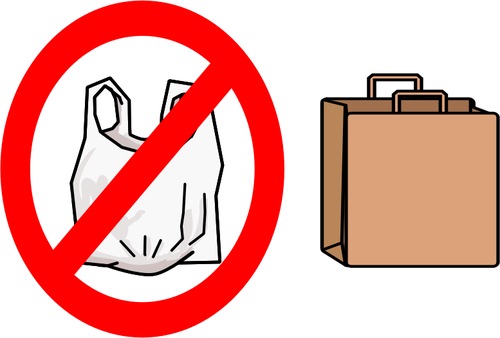The Ban on Plastic Bags

Photo courtesy of publicdomainvectors.org
April 18, 2020
Did you know, Americans use 100 billion plastic bags a year, which requires 12 million containers of oil to produce? The average family only recycles 15 bags a year while the rest end up in landfills or as litter. This is an incredible waste of resources that Jersey City has been leading the charge to fight. Starting in the summer of 2019, Jersey City started enforcing a ban on single-use plastic bags. Jersey City was the largest city in the state to implement this ban, causing a ripple effect of other towns and cities to soon follow along.
Despite the ban, the cafeteria at NJCU still has plastic bags available for use. According to Ed Mallaney, an operational controller for Gourmet Dining on campus, Gourmet Dining was told to continue having plastic available and to operate as usual. Plastic bags are being used to bag Subway Sandwiches and plastic bags are available by the cash registers for students to put their lunches in, regardless of regulations. According to Jodi Bailey, director of Student Affairs and Enrollment Management, “this law has not been enacted yet, and all entities have up to 18 months to comply. Gourmet Dining has the right to use its supply up before needing to adjust their practices accordingly”.
Whether NJCU should go through and ban plastic is up in the air at the moment. “Yes, because they’re only for temporary use and they’re thrown away and then end up everywhere afterward.” says freshman Kimberly De Leon on whether plastic bags should be banned on campus. According to Waste Management, only 1 percent of plastic bags are returned for recycling. Plastic bags are made of polyethylene. Ethylene is derived from natural gas and petroleum.
Reusable plastic bags can be made of recycled plastic, recycled bottles, thick plastic that is more durable than disposable plastic bags or cloth. New Jersey started banning plastic bags town by town starting in early 2020.
Back in December, N.J. lawmakers forwarded legislation to ban the use of plastic and paper bags, as well as plastic foam containers. The ban is making its way through several towns across the state. There is still a debate on whether there should be a bill or not banning plastics. North Bergen resident Maria Elena said, “Overall, I think it’s a great idea and a step in the right direction. People need to take issues regarding our environment seriously. I do think however there needs to be more promotion about it because I feel like a lot of people walking into stores with no clue about the ban.”
Despite the positive impact on the environment, some people think a ban on plastic is an inconvenience. Some say the ban can hurt the people that produce the bags because it can lead to layoffs for people who manufacture plastic bags. Many people find the upfront cost of buying reusable bags inconvenient and would rather just use plastic bags and go about their day. Susana Fernandez, a resident of Secaucus where plastic was banned in January, said, “I think it’s extreme and quite annoying. I will not only have to purchase reusable bags for me but for my mother. If the president of the United States does not care about saving the environment, how is not using plastic bags in the supermarket really going to help? It should start at the top.” “I know there are stores that collect plastic bags and say they recycle them, but I don’t think they do”, says Jon Wagar, Deputy Executive Director from Duke Farms.
“I don’t think anybody has an answer [whether reusable plastic bags can be recycled]”. Duke Farms is a nature preserve in Somerset County.
Despite some disagreement from people, the positive effects of plastic bag bans outweigh the inconveniences it may have for some shoppers. Research shows that plastic bans reduce trash, waste, and improves the uses of resources. Disposable plastic bags lead to more problems then reusable ones and banning them in a step in the right direction to helping the environment.












